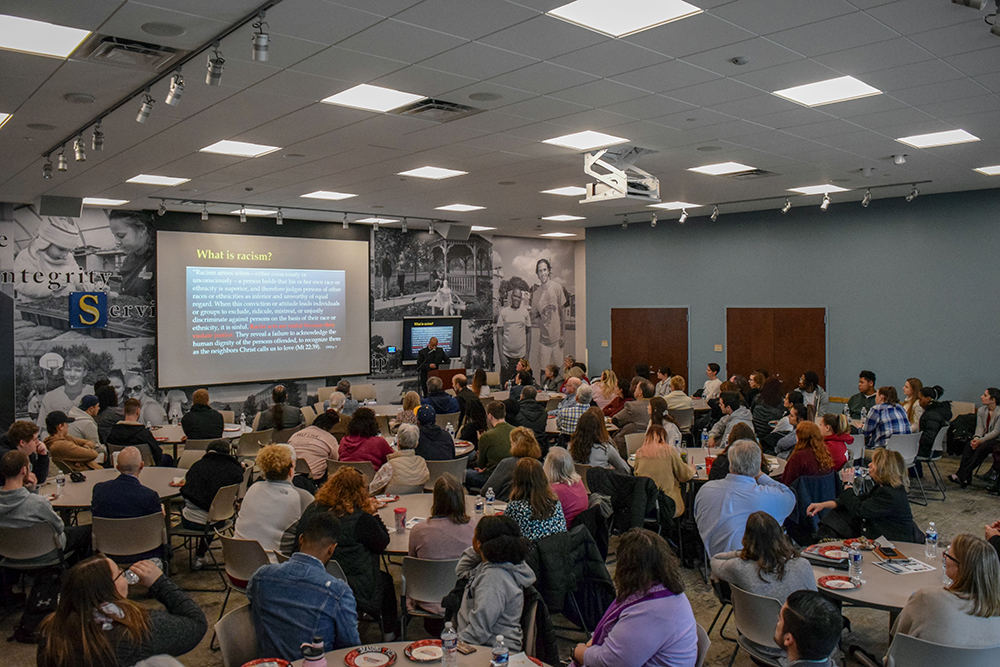
by Ashley Onorato, Class of 2020
On February 5, I had the honor of attending a presentation by Reverend Stephen Thorne, an adjunct faculty member at Neumann, about healing the racial divide. Before he started speaking, I was sitting at a table with some friends of mine and the only black woman said, “I experience it every day.” I felt for her, but I've never felt like her. As a white woman this is something I’ve never had to think about. It is not happening to me. This, of course, does not mean I can't help ease the racial divide in our world today.
Reverend Thorne focused this presentation on racial healing. He started by explaining that racism and racist acts are sins because they violate justice. As people, we all have a common origin, and racism ignores this fundamental truth. Racism finds itself in our hearts, and this is where the healing needs to occur. Thorne gives five steps that everyone can use to begin to heal the racial divide.
- Honesty
Rev. Thorne spoke about Georgetown University and its efforts to be honest about its past. He told us Georgetown University was built by enslaved African Americans. Today, instead of just giving reparations, Georgetown created an initiative and continues to educate about and recognize the fact that their school was built on racism. The honest and open conversation about the past is critical to healing. We have a choice to change and we must be honest with ourselves and others to recognize wrongdoings and take action.
- Create Safe Spaces for Courageous Conversations
Neumann University has prided itself in being accepting and diverse. With
this commitment comes safe space for students, faculty, and anyone who visits our campus. Reverend Thorne explained that dignity and truth is rooted in the Catholic Franciscan tradition. When we listen and speak in honesty with others, we create a safe space. This safe space is important in healing the racial divide as it allows people to have a chance to express their experiences, even hardships, while others to listen.
- Communication
For this step in the healing process, Reverend Thorne focused on what we
should not do, and that is to be consumed by technology. He said that phones have impeded our understanding of human dialogue. To listen, to truly listen, we must have true conversations with others without technology getting between us. With true conversation comes dignity and respect, and with those comes an open and honest conversation about racism.
- Get Comfortable Being Uncomfortable
The fourth step is from a quote by Bryan Stevenson, an acclaimed public lawyer. We as people gravitate towards our comfort zone, but in order to create change we must be open in speaking about racism, no matter how uncomfortable it may be. Reverend Thorne reflected on doing things in his life that were uncomfortable but that, in the end, made him more knowledgeable and more accepting. He even has his students do the same thing, encouraging them to go somewhere where they are the minority. They often come back appreciative of the experience.
- At the End of the Day...
God knows our hearts. God knows all. Reverend Thorne put it this way: “God sees our hearts. There is no black heaven. There is no white heaven.” He also took time to speak on privilege. Thorne said that we should use our privilege to open up someone else's door. Doing nothing is also an injustice as it does not create an honest, safe space for us to communicate on the wrongdoings that come with racism, even if we are uncomfortable in doing so. Racism is a sin. It is hate. And God does not hate anyone.
On my way home, the song Change by J. Cole came on shuffle. This song speaks about the struggle and oppression of being black. Its message reminded me of Reverend Thorne’s message of God knowing our hearts, and working to heal the racial divide to create change in our communities, in our society, and in our hearts.
“Yeah, my intuition is telling me there'll be better days
I sit in silence and find whenever I meditate
My fears alleviate, my tears evaporate
My faith don't deviate, ideas don't have a date…
But the only real change comes from inside.”
—Change, J. Cole
 CHALLENGE
CHALLENGE





